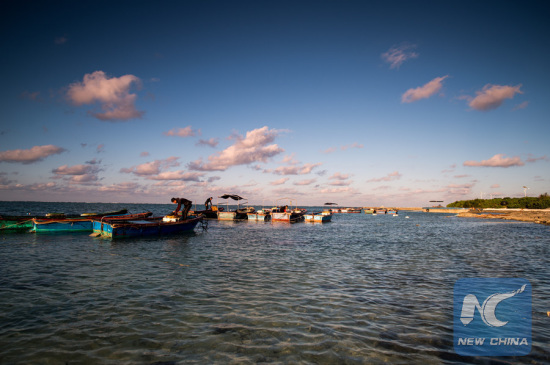
Photo taken on Dec. 11, 2015 shows uniquely beautiful winter scenery of the Zhaoshu Island in the South China Sea. (Photo: Xinhua file photo/Zhao Yingquan)
The interference of the United States in the South China Sea territorial dispute between China and the Philippines seeks to expand U.S. influence in the Asian Pacific Region through exercising pressure on Beijing, said Egyptian experts in Asian affairs.
Backed by the United States, the Philippines lodged a claim against China at the Permanent Court of Arbitration in The Hague to resolve the dispute. The world's number one super power also urged the Association of Southeast Asian Nations (ASEAN) member states for unity on the anticipated court ruling.
U.S. EXPANSION
The Filipino-Chinese maritime dispute comes amid U.S. deployment of an anti-missile defense system in South Korea that is seen by many experts as an American attempt to expand its influence in the region.
"Regrettably, such regional disputes represent an opportunity for outside parties to interfere, and this is the part the United States is awaiting to support its influence in the region by backing certain parties at the expense of others," said Mahmoud Allam, former Egyptian ambassador to China.
The ex-diplomat noted that the relation between the United States and the Philippines is well-known, as the later once was almost a U.S. colony and is considered one of the regional spots of U.S. influence.
"I believe there are mechanisms in the Southeast Asia region that can try to reach satisfactory settlements for disputes without interference of non-claimant parties," Allam told Xinhua.
Nasser Abdel-Aal, expert in Asian affairs and professor of Chinese studies at Cairo-based Ain Shams University, described the U.S. interference in the issue as "provocative," arguing it is not in favor of the South China Sea region's stability.
"The United States seeks to preserve a footstep in each spot in the world, as it does in the Middle East region, and it wants to be a thorn in China's side by backing the Philippines and Taiwan in the Asian region," the professor told Xinhua.
Abdel-Aal stressed that non-interference in other countries' domestic affairs is one of China's basic foreign policy principles and in turn China does not accept U.S. intervention in the maritime issue that it considers a Chinese domestic affair.
"Still, China's commercial, economic and even scientific relations with the United States are indispensible, yet the United States uses the South China Sea issue as a pressure card to achieve interests," he argued.
UNILATERAL ARBITRATION
While Manila referred the dispute to an international arbitration court, Beijing expressed rejection of the unilateral move and said it would not abide by the court ruling as it did not approve the arbitration in the first place.


















































